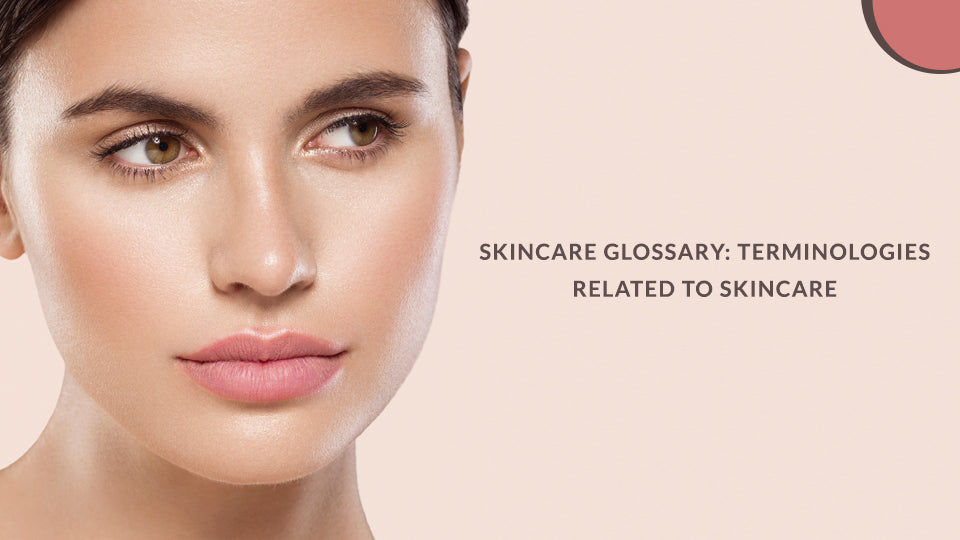Skincare Glossary: Terminologies Related to Skincare

Sometimes the biggest challenge while trying to figure out the right products for your skincare is understanding the terminologies on the ingredients list of the products. As skincare is a vast topic, many terminologies might be new to you. It's much needed to understand the ingredients on the products or in your favorite tutorial. We've compiled a glossary of skincare terminology to help you improve your skincare for a better and more beautiful skin-read on; let's get started in alphabetical order;
Antioxidants
This might be a familiar term for many by now. It's an essential ingredient that helps protect the skin from UV rays, air pollutants, impurities, etc. They are natural vitamins that help neutralize free radicals. Antioxidants effectively soothe irritated skin and reduce fine lines on the skin.
AHA
Have you ever wondered why your favorite beauty blogger stresses this term, especially regarding skin exfoliation?- AHAs or Alpha Hydroxy Acids are nothing but plant or animal-based acids that helps eliminate dead skin by acting as a natural exfoliant for the skin. Glycolic acid and lactic acid are the popular AHAs that are commonly listed in skincare products.
BHA
Another term quite familiar to the previous one is the BHAs or Beta hydroxy acids. It is a chemical exfoliant and is oil-soluble. It works great on oily skin types. The type of BHA that is most commonly used is salicylic acid.
Broad Spectrum
You would have come across this term often, especially while choosing sunscreen. Yes, it's a term used for sunscreens that offer protection against UVA and UVB radiation.
Collagen
It's an important protein that makes up eighty percent of the skin to give firmness and strength to the skin. In your skin, collagen is naturally present. However, it breaks down over time due to numerous factors. However, certain ingredients like peptides can help promote collagen production.
Comedogenic
Comedogenic and Non-comedogenic are the terms related to skin clogging. The former is likely to clog skin and may cause pimples, while the latter does not clog the pores, hence reducing the risk of breakouts. That's why dermatologists always recommend using non-comedogenic products on your skin.
Double Cleansing
It's a face cleansing technique that involves washing the face twice; by using an oil-based cleanser, followed by a water-based cleanser. This technique helps to remove tough makeup stains and impurities from the skin, leaving them crystal clear.
Emollient:
An ingredient with moisturizing properties, and most times, this term is used for a moisturizer. When applied, it keeps the skin hydrated and soft. However, when compared to a moisturizer, emollients are strong, so they are the best option to moisturize super-dry skin.
Eczema:
It's a skin condition that makes the skin itchy, dry, or rough. Sometimes it may even leave rashes on your skin, but scratching the skin can irritate the skin more. It is also known as dermatitis.
Free radicals
These are molecules caused by toxins, UV rays, and pollution that can damage the skin cells. They are also one of the reasons behind various skin concerns like discoloration and fine lines.
Glycerin
It's a commonly used ingredient in moisturizers; it's a humectant that can draw moisture from the atmosphere and keep the skin hydrated.
Hyaluronic Acid
Skincare is never complete without this ingredient. Many skincare products, especially serums, contain this naturally occurring sugar molecule.
Peptides
Peptides are amino acids that are included in skincare as they are the building blocks of essential proteins needed for the skin, like elastin and collagen. A serum containing peptides helps maintain younger-looking skin by keeping it bouncy and firm.
Retinol
It is considered one of the essential ingredients in skincare as it can help address numerous skin concerns like acne, fine lines, dullness, etc. It promotes elastin and collagen production, resulting in a firm and smooth skin.
Squalane
It's a lipid produced by the body to hydrate the skin. Squalane is also used in skincare products from plant-derived sources like olives.
T-Zone
This term is used especially in identifying the skin type, particularly oily skin. It's nothing but the "T" shape of the face, which includes the forehead, chin, and nose, mainly the surface of the skin that has more oil than the rest of the face.
UV Rays
UVA rays accelerate photoaging, while UVB rays cause sunburns on the skin, which can lead to skin cancer or melanoma.
Hope these skincare terms will help to improve your skincare regimen. So get started with a new skincare journey knowing the right ingredients to include and avoid.